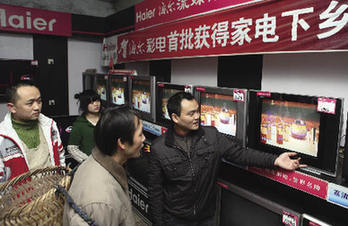|
Country Cash
Commercial concerns have neglected the rural market in the past owing to the sluggish countryside economy. Chen Xiwen, deputy director of the Office of Central Rural Work Leading Group, believes that whenever a crisis such as the present global financial crisis hits, the focus of Chinese business shifts to the rural market. And as President Hu Jintao stated: "We need to increase domestic demand and take diverse measures to boost the economy and counter the risks of global economy."
The 13 percent subsidy, however, is a paltry saving for most low-income farmers. The cheapest refrigerator costs RMB 1,090, so even with the RMB 141 subsidy there is still a balance of RMB 949 to pay, which is no small sum taking into account that the average annual income of a rural family in 2007 was RMB 10,000, according to Ministry of Agriculture statistics. Also, "Few young people are willing to do farm work now because they can earn more by doing manual labor in the city," according to a publicity department official in Linyi, Shandong Province.
A large proportion of rural surplus labor force moved to cities in the 1990s. But the countryside is now regarded as a huge consumption market just waiting to be exploited. Farmers, however, are thrifty by nature. Shi Yunguo, for example, regards spending RMB 1,000 on a TV as a luxury, with or without the subsidy. Apart from farming, Shi also runs a small village grocery. He earns around RMB 10,000 a year. The most expensive appliance his household has ever owned is a RMB 4,000 electric tricycle. "We seldom spend cash," Shi says. Most farmers in China save their money to pay for their offspring's tuition and provide for their old age. As there is no pension for retired farmers, they must look after their own interests. The worst dread for both rural and urban residents is that of unexpected ill health. As Shi says, "Minor ailments are no problem because the government gives subsidies through the rural medical and health care system. But any major surgery is far beyond our means."
Farmers hence see no great need for home electrical appliance, and would think very hard before making such a purchase. As Wang Yiguo from Hunan Province, who does manual work in Beijing to earn his daughter's tuition fee, says, "It's good to have a subsidy when buying a refrigerator, but we just don't need it."
Harsh Reality
All merchandise in Beijing's Gome and Suning home electrical appliance chains is on sale in these days. "Home electrical appliance factories are under tremendous strain because of the present downturn," a Gome employee said.
Electrical appliance shops in Linyi, Shandong Province distributed publicity literature on the "Home Appliances to the Countryside" policy hoping to attract more consumers. But Yang Hong of the Shenglong Home Electrical Appliance Company was disappointed: "It attracted people at first, but now almost no one comes to buy."
 |
|
Farmers of Sichuan Province buy color TV sets in a "Home Electrical Appliances to Rural Areas" chain store. China Foto Press |
Farmer Gao Wansheng wanted to buy a refrigerator. But on the two occasions he tried to make the purchase he was told the model he wanted was out of stock. This is because there is a narrow profit margin on such appliances. Another deterrent is the complex procedure involved in obtaining the subsidy. It requires submitting the receipt for the merchandise, ID, purchaser's bankbook and various other documents to the local finance department. The application must then be approved at various levels. The subsidy is eventually deposited to the farmer's bank account. Yang Hong believes more farmers would be willing to take advantage of the policy if the procedure was simplified.
According to government regulations, electrical appliances must be delivered to farmers' homes, especially those in remote mountainous villages. But repairs prove to be a big problem. "A TV set or washing machine that has broken down can be only fixed in the town. But I live 15 km away from the town and transporting a TV set that distance on dirt country roads is a major inconvenience," Shi Yunguo said.
Most villagers in Shi's village have mobile phones and TV sets. But few have purchased refrigerators or air conditioners because, "They are expensive and useless."
|
